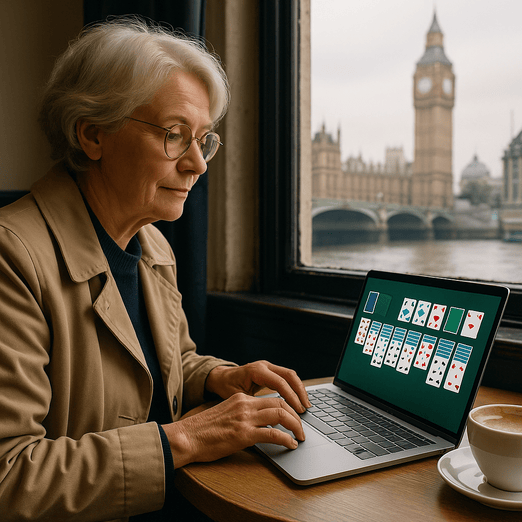
London — From “Patience” to Presence
London rewards the unhurried traveler. The city is full of quiet corners—garden squares, museum cafés, riverside benches—where a small, finite puzzle can clear the mind between bigger moments. Solitaire game (historically nicknamed “Patience” in the UK) fits that rhythm beautifully: the layout can sit open on a laptop, wait as long as needed, and resume the second it’s convenient. No timer. No pressure. Just a clean start and finish that restores focus.
Why London suits calm strategy
Spaces that invite stillness. Pocket parks, libraries, and tea rooms make it easy to step out of the rush and into a few thoughtful moves.
Built‑in pauses. Rain showers and long queues turn into gentle breaks rather than lost time when a finite game is on hand.
A culture of reflection. Galleries, historic halls, and bookshops prime the mind for slow, careful attention—the same mindset that makes a hand of solitaire feel satisfying rather than stressful.
Flexible pacing. A layout can be left open and finished later; nothing forces a race to the end. That control over tempo is ideal on travel days.
For travelers who like a familiar, brain‑friendly reset between sights, a quiet round of solitaire offers exactly that: a contained challenge that ends when you want it to.
A soft day plan (with room for cards)
Morning: clarity before crowds. After breakfast, settle into a calm corner and open one layout. Give the session a single purpose—reveal an early face‑down card or create one empty space. When focus returns, close the hand. Done is the goal, not perfection.
Midday: art, walks, and a gentle pause. Between exhibits or errands, a few measured moves can act like palate cleanser for the brain. If the board feels sticky, step away; London’s streets are part of the plan.
Evening: wind‑down, not wind‑up. Choose a variant that matches your energy. Keep decisions simple: make moves that either reveal a card or complete a clean sequence. If a line feels forced, back up two steps and pick the clearer path.
Micro‑drill for rainy‑day clarity (no timers)
This short routine compresses “rules” into instinct while you travel:
Pre‑scan: Identify two routes that would flip a face‑down within three actions.
Commit: Follow one route without rushing. If it stalls, undo to the last fork.
Switch: Try the second route; favor the move that keeps suits clean or opens space.
Note: One line only—“early empty created momentum” or “mixed suits cost progress.”
Two passes are enough. The goal isn’t a win streak; it’s a steadier mind for the rest of the day.
Brain and body benefits on the road
Attention without overload. Solitaire engages working memory and planning, then ends neatly—helpful before dinner reservations, bedtime routines, or early trains.
Eye comfort. Static cards and predictable motion are easier on eyes than fast‑cut feeds. Blink naturally and look away often; the game won’t move without you.
Stress fit for travel. A finite puzzle provides structure when the itinerary changes. The hand can pause for a downpour and resume with clear intent.
What to play in London (match your mood)
Klondike: Balanced and forgiving; ideal for a short reset between sights.
Spider: Deeper planning for museum‑day afternoons when the mind wants a real puzzle.
TriPeaks: A rhythmic, upbeat feel that lifts energy without rushing.
Prefer to keep things fully digital while you’re out and about? A few measured hands of solitaire provide the same calm structure—no sign‑ins, no social feed, just a layout that waits for you.
A small traveler’s ritual
Set one intention. “Reveal early,” “protect suit integrity,” or “tidy one run.”
Make three deliberate choices. If a move feels like noise, skip it.
Stop on clarity. When attention feels restored—win or not—close the hand and head to the next stop.
Parting note
London’s best days mix stimulation with stillness. A museum, a walk, a cup of tea—and a short, finite puzzle that ends precisely when you choose. That’s the promise of this city and the practice of solitaire: presence over hurry, decisions over noise, a clean finish before the next scene.
